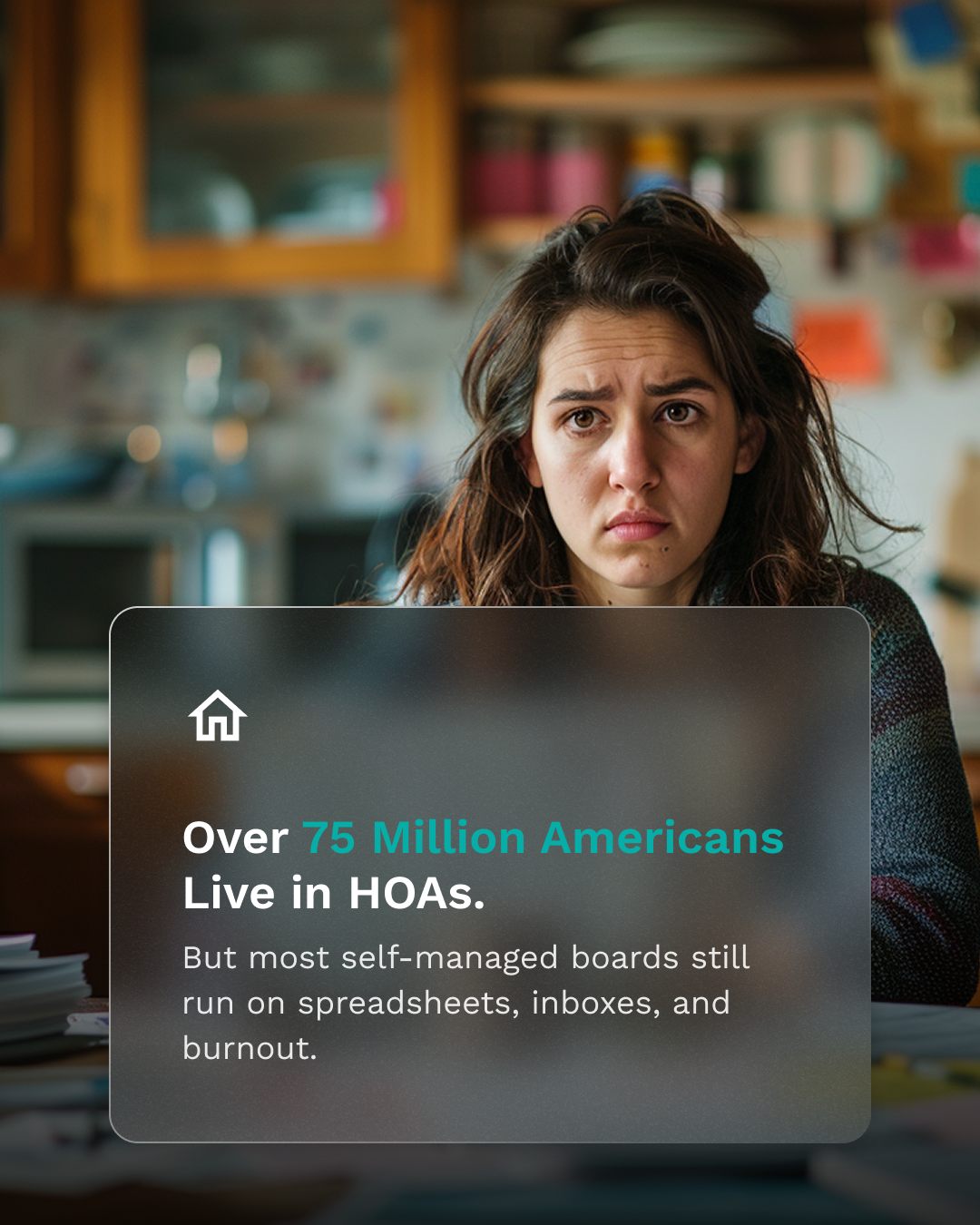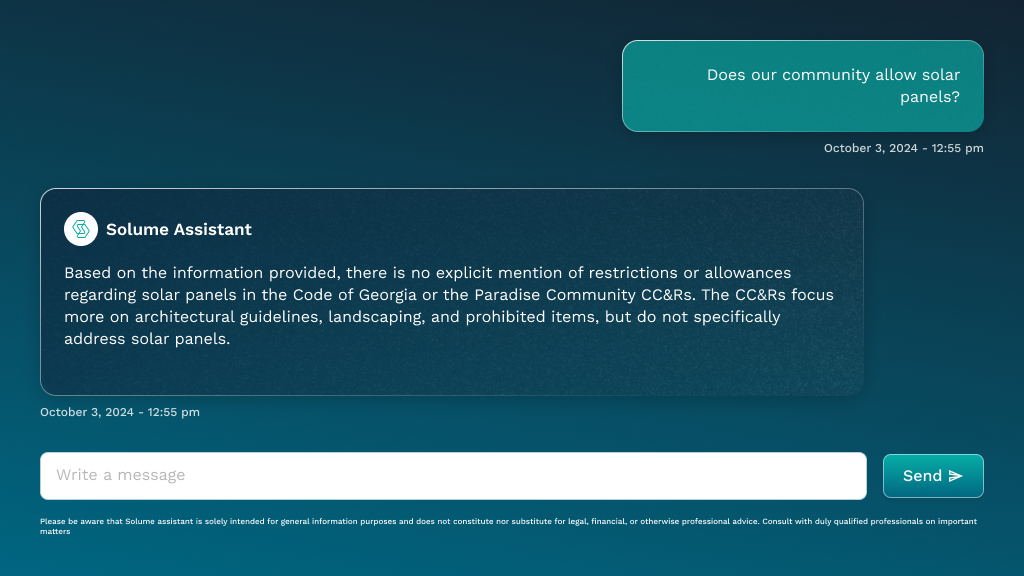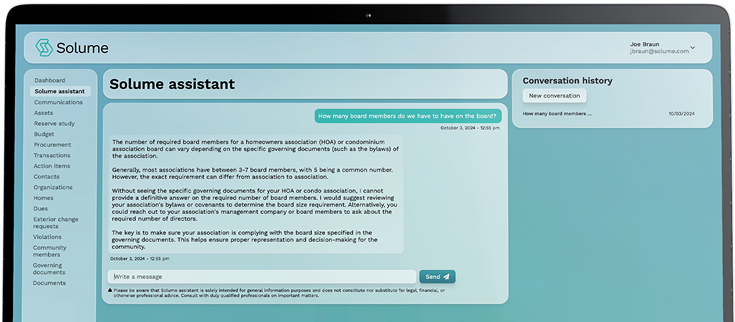If you’ve ever served on an HOA or condo board, you know the drill: group texts, scattered weirdly-formatted spreadsheets, late-night emails, and that one PDF nobody can ever find when you need it. We’ve listened to hundreds of boards—some who chose Solume, and plenty who didn’t. The story is almost always the same: volunteer board members doing their best, but burning out because there’s no system in place to make their lives easier.
Meanwhile, big software companies show up with polished marketing and impressive feature lists, and it’s easy to believe they’re the best option on the market. And to be fair, some of them do offer good tools. But here’s the truth: most of those platforms weren’t built for HOAs. They were built for management companies, apartment buildings, or large-scale real estate portfolios, then retrofitted for communities like yours. Solume is different. We started with the HOA and Condo board and built everything around what real communities actually need. No fluff. No enterprise-level nonsense. Just everything in one place, designed to be so simple your least tech-savvy neighbor can run with it.
What Boards Are Struggling With
1. What problems does HOA software actually solve?
There are a few important reasons why HOAs need specific software. Asset management or reserve study management is among the most important. Missed deadlines and forgotten inspections are major reasons why communities fall apart and have special assessments.
This leads to volunteer burnout from trying to keep track of everything on spreadsheets, group texts, and email threads.
Lack of transparency with homeowners leads to mistrust. By not having a centralized system where everything is tracked and visible when needed, people lose trust in the board.
2. How do you know when your community has outgrown spreadsheets and emails?
Spreadsheets can work if you have someone on your board who’s a master at spreadsheets and plans on staying on the board for decades. Otherwise, if a board member finds herself/himself copying and pasting info from different places into an email, it’s time to centralize it all.
Additionally, there are legal reasons why it’s essential to have a centralized place for all information - communication, budgets, reserve planning, vendor procurement, architectural requests - these can’t easily be tracked and publicly available. Solume is the only all-in-one HOA and Condo Management software that allows boards to track their reserve study, financial forecasting, and everything else in one place.

3. How do you decide what HOA software to choose?
When deciding what software to use, you need to balance ease of use and the features your community needs. Some of the biggest names out there are clunky, legacy software that are nearly impossible to pick up easily. Other software might be easy to navigate, but it doesn’t have all the features even the smallest communities need.
Look for tools that track everything your community needs (and laws require). Remember, in most cases, HOAs and Condo Associations are volunteer boards, not professional managers. Solume strikes that balance so boards that aren’t tech savvy can navigate with ease, but it also has all the features most communities need.

What the Numbers Say (and Why It Matters)
4. How many HOAs in the U.S. still don’t use software?
While over 70% of professionally managed HOAs use professional software, considerably fewer self-managed communities do. With over 75 million people living in HOAs or condo associations, this isn’t a small problem. Solume bridges the gap by giving volunteer boards the structure of a professional manager without the cost or complexity. We give volunteer boards the systems they need, without having to hire a management company.
5. Why does HOA software matter more in self-managed communities?
The vast majority of HOA and condo association boards are made up of unpaid volunteers who balance their own lives - work, children, friends. So software is essential because the boards need more support, not a bunch of tasks that get left behind or fall through the cracks.
Even smaller boards risk legal exposure or resident pushback due to disorganization. With the high turnover rate of HOA boards (1-3 years in many cases), boards must have a centralized place where information is accessible to new board members as they roll on (and previous board members don’t leave and take vital information stored in their in-box or on their computer).

6. How much time can software actually save your board?
We recently spoke to a board member of a small community (14 single-family homes), and she spends on average 3-5 hours a week on “HOA stuff.” Between budget reconciliation, vendor procurement, tracking down dues, and reminding the other board members they need to review the ARC requests, she desperately needed a system. Solume showed her how we set up automations to handle many of her manual tasks, reducing her time to as low as 3-5 hours a month.
How It Affects the Whole Neighborhood
7. How can software improve communication with homeowners?
Many HOA board members mention dues collection, sending out reminders, and answering questions that homeowners should look up themselves among the most time-consuming (and frustrating) parts of being on their board. Solume automates most of the busy work, answers the most obscure questions about your community, and allows board member to actually enjoy their role. Communication about rules and regulations, stats updates on ARC requests, and financial management are all at your fingertips, so you’re not having to chase them down manually.
8. Will software help reduce violations and conflict?
HOA violations happen for two primary reasons: people don’t know the rules, or they think the rules are stupid and don’t apply to them. No software can help you with the latter. However, software can help with reminders before violations occur and provide a public platform where homeowners can access the rules.
Boards should track violations and keep a record of those violations for a minimum of three years. With Solume, boards avoid selective enforcement by keeping everything trackable.
9. What kind of feedback do homeowners give when communication improves?
Honestly, you start to feel the shift pretty quickly. People stop assuming the worst. You’ll hear things like, “I finally know what’s going on,” or “Thanks for the heads up, normally we find out after the fact.” Even if someone doesn’t agree with a decision, they’re less angry if they were part of the process, or at least looped in.
It’s not magic, but it lowers the temperature. Less finger-pointing. Less guessing. And when people stop feeling blindsided, the board stops feeling like it’s constantly playing defense.

Picking the Right Software (Without Getting Burned)
10. What features actually matter in HOA software?
Software companies will put a lot of fluff into their functions just so they can sell you on additional features. The best way to approach this is to take a step back and think about, “What do we actually need?” What you need may or may not align with what they have (also, what you need might be directly tied to what the law states).
Here are a few features to consider when making your decision on what HOA software to use: dues collection in-app, Reserve Fund tracking, violation notification and tracking, ARC requests, budget, transaction tracking, and communication to owners and residents.
The bottom line is this: Does it make your life easier and keep you compliant?
11. What’s the difference between software for managers vs self-managed boards?
Many software companies marketed to HOAs weren’t actually built for HOAs. They were built for another purpose, but then adopted by HOAs as a make-do solution. Large, legacy software platforms assume you have a paid staff who have the time to master their clunky features. There’s a disconnect between a volunteer board’s reality and what solutions are available.
CINC Systems
- Built for portfolio management companies
- Deep accounting tools, but not user-friendly for volunteers
- Known for complexity and reliance on formal training
TOPS [ONE] (by Enumerate)
- Longstanding name in HOA software
- Powerful backend but often clunky and outdated interface
- More geared toward management firms than self-managed HOAs
Vantaca
- Designed for large-scale association managers
- Workflow-heavy system that requires formal roles and permissions
- Not ideal for small or midsize, self-run communities
AppFolio (Property Manager)
- Primarily a rental property and portfolio management platform
- Offers HOA tools but as a secondary function
- Often feels too complex or off-target for board-led communities
Buildium
- Also originally created for property managers
- Used by HOAs but not purpose-built for them
- Limited flexibility for HOA-specific workflows like ARC or reserve tracking
Yardi
- Enterprise-level solution for large real estate and association portfolios
- Expensive, complex, and overkill for most self-managed HOAs
- Not designed for community-first workflows
These platforms are considered “legacy” not because they’re obsolete, but because:
- They were built for a different era (or a different user: management companies).
- Their interfaces, workflows, and assumptions don’t reflect how modern, self-managed communities operate.
- They often feel like using an enterprise system to manage a neighborhood BBQ.
Solume wasn’t built for management companies and then repackaged for HOAs. We started with self-managed communities from day one—specifically with board members who are volunteers, not software pros. Every feature was designed around what boards actually need: tracking dues, violations, ARC requests, reserve planning—without all the bloated extras that just get in the way.
And most importantly, it’s dead simple to use. Even the least tech-savvy person on your board can log in and actually use it.

12. Is free HOA software worth it?
Free HOA software is sometimes worth what you’re paying for! If all you need is one or two features to get a simple task done, there are free options out there. The complaints we’ve heard, though, are that they didn’t realize they were signing up to SPAM their neighborhood with ads. You have to remember that a free tool is only free because it is profiting from your data in some other way, such as ads targeting your neighborhood, or confidential information could be exposed.
Also, free tools have a lot of limitations, not to mention no tech support.



